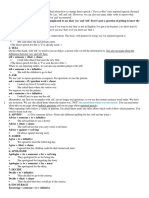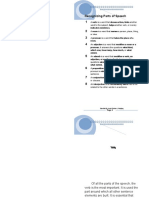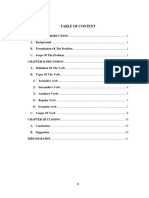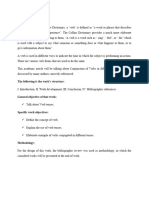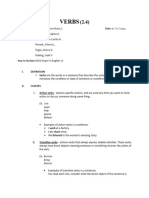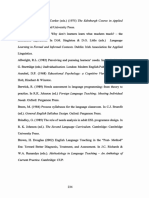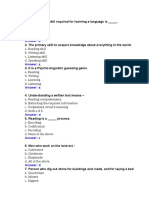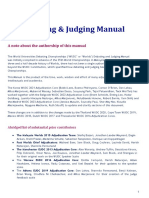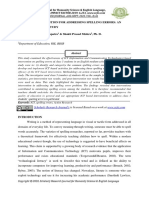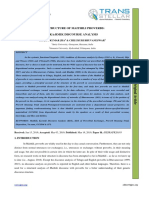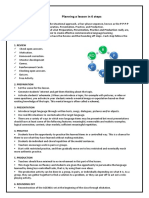Lesson 13 – Infinitive or –ING Game Show (Part 2)
Are you ready for part 2 of the Infinitive or -ING Game Show?
Today's verbs are all followed by indirect objects before the infinitive or -ING form.
For example:
I'll never forget my son winning first place in the science fair.
We invited them to sit next to us.
In the first sentence, the main verb forget is followed by an indirect object (my son)
and then the -ING form (winning). In the second sentence, the main verb invited is
followed by an indirect object (them) and then the infinitive (to sit).
1. I’d advise you seeking / to
seek professional help.
2. My mother doesn't approve of my
father watching / to watch TV all
day.
3. I just can't imagine her working / to
work as a teacher.
4. The boss doesn't allow us eating /
to eat lunch at our desks.
5. I remember her being / to be thrilled when she heard the news.
6. She reminded him returning / to return the library books.
7. I'll get my friends helping / to help me move into my new place.
8. I resent him taking / to take credit for the whole team's work
9. My teacher encouraged me studying / to study abroad.
10. I appreciate you responding / to respond to my e-mail so quickly.
11. The defect caused the machinery malfunctioning / to malfunction.
12. I forced myself smiling / to smile, although I wasn't very happy.
(Answers at the end of the document)
How did you do?
www.espressoenglish.net
© Shayna Oliveira 2014
�Here's a quick summary of the verbs that follow each pattern. Do you notice
any general themes that the verbs in each category have in common? I'll explain the
themes as we look at each category of verbs more closely.
Verbs + object + infinitive:
advise, allow, remind, get, encourage, cause, force
Verbs + object + -ING:
approve of, imagine, remember, resent, appreciate
Verbs + object + infinitive (with TO)
Verbs that follow this pattern tend to be verbs meaning we say something that will
have a direct influence on another person, and verbs where we are permitting or
forcing another person to do something:
Persuading / influencing someone:
advise I’d advise you to seek professional help.
command The judge commanded the witness to speak.
order My boss ordered me to rewrite the report.
encourage My parents are encouraging me to study abroad.
urge I urged him to stop smoking.
invite We invited them to sit next to us.
persuade She’s trying to persuade me to cut my hair.
remind Could you remind me to return the library books later today?
teach My cousin is teaching me to sing.
tell The doctor told us to eat more vegetables.
warn He warned me to be careful.
www.espressoenglish.net
© Shayna Oliveira 2014
�Actions of permission and force:
allow I don’t allow my kids to watch violent movies.
permit She doesn't permit anyone to use her computer.
authorize He authorized them to access the confidential information.
cause The defect caused the machinery to malfunction.
force I forced myself to smile, although I wasn’t very happy.
get I’ll get my friends to help me move into my new place.
require The school requires all students to buy textbooks.
The most common error that most students make with these verbs is leaving out
"to":
The school requires all students buy textbooks.
The school requires all students to buy textbooks.
I’d advise you seek professional help.
I’d advise you to seek professional help.
We invited them sit next to us.
We invited them to sit next to us.
Verbs + object + ING
Compared with the list of verbs + object + infinitive, there are relatively few verbs
that are followed by the object + -ING. They are often verbs we use to talk about
our thoughts or opinions about other people's actions.
For example: appreciate, detest, (dis)approve of, (dis)like, hate, love, object to,
forget, imagine, remember, and think of:
I approve of my wife quitting her job. She never liked the work, anyway.
www.espressoenglish.net
© Shayna Oliveira 2014
� My sister hates getting dirty; I can't imagine her going on a week-long hiking
trip.
What do you think of Ryan proposing to his girlfriend after only a month of
dating?
My colleague objects to my getting promoted, because he thinks he's more
qualified.
With these verbs, we can actually use one of two structures:
verb + noun/pronoun + verb-ing
(more common)
I resent him taking credit for the whole team's work.
verb + possessive + verb-ing
(less common; more formal)
I resent his taking credit for the whole team's work.
Again, the most common error made by students is using the base form:
I approve of my wife quit her job.
I approve of my wife quitting her job.
I resent him take credit for the whole team's work.
I resent him taking credit for the whole team's work.
Verbs + different prepositions + ING or Infinitive
Some verbs can be followed by certain prepositions, and then the -ing form of the
second verb in the sentence. With some of these verbs, you can also have an object
(noun, pronoun, person's name).
Let's continue our game show. Can you guess the correct preposition in each case?
ONE of the three prepositions will fit all three sentences.
Hint: at / by / for
Let's begin the meeting ____________ planning the timeline for the project.
www.espressoenglish.net
© Shayna Oliveira 2014
� He finished his speech ____________ summarizing the main lessons.
In the early days of our business, we started out ____________ selling door-to-
door.
Hint: in / on / of
Don't bother me - I need to concentrate ____________ finishing my homework.
The research will depend ____________ getting funding from the government.
She insists ____________ taking a taxi rather than the subway.
Hint: from / for / with
I'm trying to discourage my cousin ____________ dropping out of school.
Your mother doesn't want to keep you ____________ having fun; she's just
concerned for your safety.
Thank you so much. Your advice stopped me ____________ making a big
mistake.
(Answers at the end of this document)
We also have a handful of verbs that are often followed by other prepositions before
continuing the phrase with the indirect object + infinitive:
arrange / wait + FOR
I arranged for my parents to stay at a nearby hotel.
We're waiting for you to get off the phone.
count / depend / rely + ON
Everyone on the team is counting/depending/relying on you to do your part
of the project.
gesture / motion / signal +FOR/TO
The other driver signaled for/to me to go ahead at the intersection.
www.espressoenglish.net
© Shayna Oliveira 2014
�Put it into practice!
What's something you're waiting for someone else to do?
I'm waiting for _________ to ___________
Who is counting on you to do something?
___________ is counting on me to ____________.
Special Case #1: Verbs + object + -ING or base form
There are a few verbs in English that can be followed either by -ing or by the base
form of the verb. These are mostly verbs of perception like feel, hear, notice,
observe, overhear, see, and watch.
Usually the base form implies that you saw the entire action,
whereas the -ing form means you saw a part of the action
while it was in progress. Compare these examples:
I heard her talking on the phone.
(conversation in progress)
I heard her say she wanted a divorce.
(single statement - single moment in time)
We saw the kids playing soccer in the street.
(game in progress)
We saw our son score a goal.
(single action - single moment in time)
Special Case #2: Verbs + object + base form
(without TO)
There are four verbs that use this structure: let, make, have, and help
The teacher doesn’t let us to use cell phones during class.
I made my son to apologize to his sister.
www.espressoenglish.net
© Shayna Oliveira 2014
�The verb have is used in multiple ways in English. When we use it for our
own obligation, we say "have + to + verb." When we require someone else to do
something, then we say "have + object + verb" (without "to"):
I had to give a presentation in class.
my own obligation: had + to + give
The teacher had each student give a presentation.
the teacher is requiring others (the students) to give presentations
I have to call Mr. Smith today.
my own obligation
I'll have my assistant call Mr. Smith today.
I am requiring someone else (my assistant) to make the call
Although it's possible to say "help + to + verb," it's far more common in everyday
English to say "help + verb"
Could you help me (to) carry these boxes?
My therapist helped me (to) overcome the pain of my divorce.
Put it into practice!
If you have (or if you had) kids, what's one thing you would let them do, and
one thing you would not let them do?
I'd let my kids __________
I wouldn't let my kids ___________
Say two sentences about a time when you've helped someone, and someone
has helped you:
I've helped __________ ___________
_________ has helped me __________
You’ve finished Lesson 13! Now try the exercises to get more practice with the verb
patterns you learned today.
www.espressoenglish.net
© Shayna Oliveira 2014
�Quiz – Lesson 13
Exercise 1:
Complete each sentence with the verb indicated, in one of these three forms:
Infinitive (to study)
-ING form (studying)
Base form (study)
1. He loves being right, and he always tries _______________ (force) others to agree
with him.
2. The non-profit is trying to persuade people _______________ (support) their
campaign.
3. I strongly object to my government _______________ (start) wars for financial
profit.
4. Can you help me _______________ (figure) out this math problem?
5. A terrible experience caused me _______________ (lose) faith in organized
religion.
6. You should charge more. I hate _______________ (imagine) you doing all that
work and not getting paid fairly.
7. She's always bragging about herself and making me _______________ (feel) like
I'm inferior.
8. I urged her _______________ (reconsider), but she says her mind is made up.
9. We really appreciated them _______________ (take) the time to help us.
10. Hey! I told you _______________ (not touch) my laptop!
11. I didn't hire a professional photographer, I just I had my cousin _______________
(take) all the pictures at my wedding.
12. The police officer ordered me _______________ (show) him my driver's license.
13. My parents don't approve of my _______________ (get) a tattoo.
14. I don't have a tent, but I'll get my brother _______________ (lend) me his for the
weekend.
15. They let their kids _______________ (do) whatever they want.
www.espressoenglish.net
© Shayna Oliveira 2014
�Exercise 2: Complete each sentence with the correct preposition:
at from on
by in to
for of with
Note: They can be used more than once, and some are not used.
1. I'll arrange ___________ a taxi to take you to the airport.
2. This headband keeps my hair ___________ falling in my face while I exercise.
3. The security guard prevents unauthorized people ___________ entering the
building.
4. I'd like to start ___________ thanking you for the opportunity to speak today.
5. Make sure to focus ___________ what's really important.
6. Can I rely ___________ you to get the job done right?
7. Let's finish up the class ___________ sharing one goal for the next week.
8. The magician motioned ___________ me to come up on stage.
Writing Task
Write about someone who has had a significant influence on you – it could be a
parent or other relative, a teacher or mentor, or another role model. How has this
person affected your life?
Send your text to shayna@espressoenglish.net for comments and feedback!
www.espressoenglish.net
© Shayna Oliveira 2014
�Answers – Game Show in Lesson
1. I’d advise you to seek professional help.
2. My mother doesn't approve of my father watching TV all day.
3. I just can't imagine her working as a teacher.
4. The boss doesn't allow us to eat lunch at our desks.
5. I remember her being thrilled when she heard the news.
6. She reminded him to return the library books.
7. I'll get my friends to help me move into my new place.
8. I resent him taking credit for the whole team's work
9. My teacher encouraged me to study abroad.
10. I appreciate you responding to my e-mail so quickly.
11. The defect caused the machinery to malfunction.
12. I forced myself to smile, although I wasn't very happy.
Prepositions
BY - begin, close, end, finish (up), start (off/out)
Let's begin the meeting by planning the timeline for the project.
He finished his speech by summarizing the main lessons.
In the early days of our business, we started out by selling door-to-door.
ON - concentrate, count, depend, focus, insist, rely
Don't bother me - I need to concentrate on finishing my homework.
The research will depend on getting funding from the government.
She insists on taking a taxi rather than the subway.
FROM - deter, discourage, keep, prevent, prohibit, stop
I'm trying to discourage my cousin from dropping out of school.
Your mother doesn't want to keep you from having fun; she's just concerned
for your safety.
Thank you so much. Your advice stopped me from making a big mistake.
www.espressoenglish.net
© Shayna Oliveira 2014
�Answers – Quiz 13
Exercise 1
1. He loves being right, and he always tries to force others to agree with him.
2. The non-profit is trying to persuade people to support their campaign.
3. I strongly object to my government starting wars for financial profit.
4. Can you help me figure out this math problem?
5. A terrible experience caused me to lose faith in organized religion.
6. You should charge more. I hate to imagine you doing all that work and not
getting paid fairly.
7. She's always bragging about herself and making me feel like I'm inferior.
8. I urged her to reconsider, but she says her mind is made up.
9. We really appreciated them taking the time to help us.
10. Hey! I told you not to touch my laptop!
11. I didn't hire a professional photographer, I just I had my cousin take all the
pictures at my wedding.
12. The police officer ordered me to show him my driver's license.
13. My parents don't approve of my getting a tattoo.
14. I don't have a tent, but I'll get my brother to lend me his for the weekend.
15. They let their kids do whatever they want.
Exercise 2
1. I'll arrange for a taxi to take you to the airport.
2. This headband keeps my hair from falling in my face while I exercise.
3. The security guard prevents unauthorized people from entering the building.
4. I'd like to start by thanking you for the opportunity to speak today.
5. Make sure to focus on what's really important.
6. Can I rely on you to get the job done right?
7. Let's finish up the class by sharing one goal for the next week.
8. The magician motioned for me to come up on stage.
www.espressoenglish.net
© Shayna Oliveira 2014











